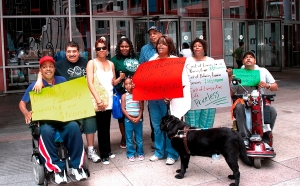The Inclusive Home Design Act aims to increase the number of homes accessible to people with disabilities by applying visitability standards. The principle of visitability seeks to create homes that are affordable and sustainable, and utilize a design approach that integrates accessibility features into newly-built homes. Last week, Beto Barrera, Access Living’s Manager of Community Development, testified in support of the Act in Washington, D.C. in front of the Subcommittee on Housing and Community Opportunity. Below is his testimony.
The Inclusive Home Design Act of 2009 – Introduced by Congresswoman Jan Schakowsky
Testimony submitted by Alberto Barrera, Manager of Community Development, Access Living of Metropolitan Chicago
September 29, 2010
Introduction
I would like to thank Congresswoman Jan Schakowsky and the members of the Subcommittee on Housing and Community Opportunity for allowing me to testify today on an issue that is at the heart of all the advocacy work that I do. My name is Beto Barrera. For the past 20 years at Access Living, I have been personally involved in advocating for visitable housing in publicly assisted housing.
Access Living: Our Mission and a Brief History
Access Living is Chicago’s only Center for Independent Living, serving the 600,000 people with disabilities in metropolitan Chicago. For the last thirty years, we have dedicated ourselves to the self-determination and independence of people with all kinds of disabilities. We do this by fighting for disability rights and by supporting our community with independent living services run by people with disabilities, for people with disabilities. Our work affects people with disabilities not only in Chicago but across the nation. We have fought to increase access to public transit, public education, employment, health care and access to housing. Above all we look to find ways to liberate our people from systemic segregation and warehousing. Housing is key to our freedom.
Availability of Usable Housing for People with Disabilities
Public assisted housing is the main source of housing for people with disabilities earning SSI and SSDI incomes. In most cases these incomes are at 15% or less of the area medium income, (AMI). Access Living receives an average of 4,000 inquiries for accessible, affordable housing annually. And an average of 60 people come to our monthly housing counseling sessions.
The Chicago Housing Authority, or CHA, has reported that in 2009 they received 84 requests from residents with disabilities requesting retrofit modifications and for ground floor no step entry units. So far this year the CHA has received 62 such requests. We at Access Living think the actual demand for accessible housing is much higher.
Requests Received By Access Living for Access Modifications
For the past 10 years Access Living has administered an access modification program funded by the CHA. Our modification program assists people with disabilities in CHA’s Home Choice Voucher program. What started as a pilot program with $30,000 has now reached $145,000 annually. We assist 60 to 70 very low income residents with disabilities. Of course this does not begin to address the total need in our community.
Access Living’s retrofit fund covers very basic modifications: wider entryways, accessible switches and outlets, ramps, and bathroom modifications such as grab bars and accessible sinks. These are some of the basic access features included in the Inclusive Home Design Act. There are other modification programs throughout the country, but we cannot depend on retrofits for basic access, most have long waiting lists and it’s not unusual for people to end up in a nursing home or dying while waiting for modifications.
Comments on the Inclusive Home Design Act
This legislation has been in development for twenty years and in Congress for the last eight years. It came out of a joint effort between grassroots people, Congresswoman Schakowsky, and advocates such as Eleanor and many other activists, who were deeply concerned with the exclusion of people with disabilities from housing opportunities. The national grassroots disability rights group ADAPT has also worked with us to support this bill and it is part of ADAPT’s housing agenda.
This legislation will begin to end the practice of “exclusion by design,” which is a form of disability oppression. Simply put, requiring that all newly constructed publicly assisted homes contain a no-step entrance and useable space on the ground floor will finally provide real access to options for people with disabilities in our struggle to locate affordable, accessible and integrated housing.
The Inclusive Home Design Act is the missing link of the Fair Housing Amendments Act of 1988. Its passage will complete the circle of civil rights in public assisted housing, guaranteeing full and equal access for all! The Inclusive Home Design Act is a step forward to end the culture of social isolation currently accepted and practiced in our country, against people with disabilities. It will provide equal opportunity for very low income Americans with disabilities to have equal access to all public assisted housing. We believe that the passage of this bill, along with the Money Follows the Person demonstration project and the hope for- passage of the Choice Community Act will provide the structure needed to honor the spirit of the Americans with Disabilities Act—the spirit that said every person with a disability has a right to full access to society.
Thank you again for conducting this hearing and for having me here today.


